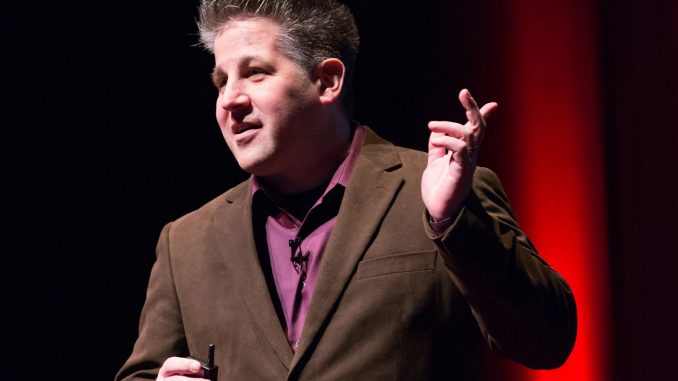
Eric Corey Freed has some bad news.
In terms of sustainability, he said, life is depressing.
“Not only are you doomed but you’re really doomed,” Freed said. “For the last 15 years I’ve been speaking publicly about it. Humor started creeping in almost as a coping mechanism for me. How do you deliver bad news to the audience and what would be the point of delivering all this bad news? How do I make it memorable and how do I make it actionable?”
“A spoonful of sugar helps the medicine go down,” he added.
The West Philly native has published several books and runs organicARCHITECT in San Francisco, an architecture firm focused on full-scale sustainability and nature-focused, responsible building.
The University of Pennsylvania hosted its TEDx event at the Zellerbach Theater at the Annenberg Center on April 12. Freed was one of the speakers at the event, discussing sustainable architecture.
Osama Ahmed, a junior studying biophysics, statistics and business at Penn, was in charge of marketing and public relations for this year’s event.
Being the first year the school has a full license for a TEDx program, the student-run organization responsible for curating the talks and facilitating the technical aspects looked to upscale the attendance and present heady and relevant ideas with speakers who had an important idea worth spreading, Ahmed said.
“The whole thing with TED is that we want to make it a very curated, holistic event so the first and foremost thing is that, in some way, each of the speakers has to be connected with our theme,” he said. “So we look for someone with a very interesting idea, someone who we’d want to give a platform to for sharing that idea.”
Ahmed said the committee whittled the list of 180 possible candidates over the past nine months of planning down to the 16 who took the stage on Sunday. Despite being their first year as a fully licensed TEDx event, Freed said the organizers were hyper-organized, having him rehearse his talk three times.
“I think that’s very important that we get to hear these transformative ideas which, right now, in some cases, may even seem crazy but they might very well be what the future looks like in 20 years,” Ahmed said. “I think it’s extremely important for there to be a platform at universities, at institutions, to highlight these ideas and we’re very proud that TEDxPenn is one of those platforms right now.”
Ahmed said the response to posting Freed’s speaker bio on the event’s Facebook page “spoke to the fact that he did generate a lot of interest.”
Freed’s speech, nestled in the second round of talks within the theme of “Spark,” used humor to engage with the audience and convey his ideas of green architecture and sustainability.
Between sessions and after his talk, Freed signed copies of his 11th book, “Green$ense for the Home: Rating the Real Payoff from 50 Green Home Projects” for those interested. The book details the intersection between affordability and environmental self-sufficiency, two ideas Freed said run inherently parallel.
“Not only are [self-contained buildings] possible, they benefit the bottom line,” Freed said. “The operational costs of these buildings are so cheap that you can’t afford to ignore these ideas anymore.”
During his time at Temple, Freed took classes at Temple’s Rome campus, which he said forever shifted his view of the world and of design.
“I went from being this kind of very academic kid to going to Rome and applying these ideas and it made me realize how big and interesting the world is,” Freed said. “I would say the lessons at Temple Rome stick with me to this day so I couldn’t wait to get out of Philadelphia and get moving and explore the world.”
Freed said his professors at Temple in architectural history, methods and materials of construction and mechanical and electrical helped bring such relevant sustainability ideas to life.
“I think I was fortunate, specifically for those three classes, that I had professors that made what could have been a boring subject really interesting and really enlightening,” Freed said.
He brought that same concept to the stage, he said, and to more than 100 talks he has given on the subject.
Colton Shaw can be reached at colton.shaw@temple.edu.



Be the first to comment